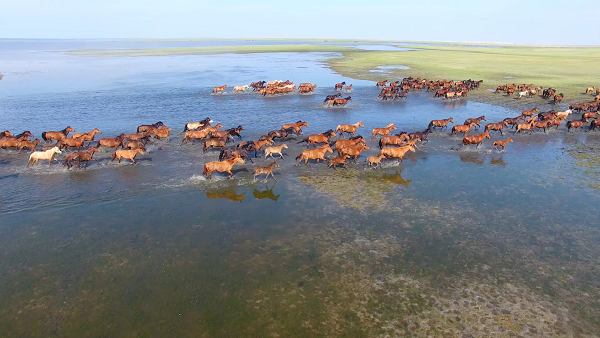Water guardian's tide of progress
Protecting lakes from pollution ensures environmentalist has a clear sense of achievement, report Yang Feiyue and Yuan Hui in Hohhot.
By Yang Feiyue and Yuan Hui | China Daily | Updated: 2023-01-17 07:57

The water quality check has to be conducted once a month, come rain or shine.
"The freezing of the surface will result in a reduction of oxygen in the water, which could affect fish and other living creatures in the lake," Xie explains, adding that keeping track of the water quality will help preserve its ecology.
"We're more like a health checkup department. Once the problem is spotted, other related departments will come in to intervene."
After they reach a water sampling point, they will start drilling through the ice, which is sometimes 1.5 meters thick.
The manual work is demanding amid the wisps of white air rendered by the cold temperature that is 40 degrees below zero.
When the ice is drilled through, water sampling ensues according to stringent protocols.
"For example, it has to be about 50 centimeters below the water surface, for fear of interference from drifting leaves or ship oil residue," Xie explains.
The lake covers an area of more than 220,000 hectares and was one of the first lakes in the country to have water ecology evaluation carried out.
Xie spends the daytime with his colleagues sampling water and then analyzing data at night.
He knows about the perils of nature. He has traversed the uninhabited grasslands, stayed in the dormitories of border guards, experienced skin allergies brought about by mosquito bites, and even had a few close calls when the car was trapped in muddy swamps for a long time.
"The harsh natural environment comes with the territory," he says.
But Xie has come to enjoy it.
He loves to see the water distribution through the satellite images before planning the routes of his expedition.
"When I get back from a field trip, I review it online, and it will enhance my perception of the surrounding environment," Xie says.
Plus, he has got to appreciate nature's wonder as some of the water sites are tucked away in stunning landscapes.
Wearing thin-framed glasses, dark blue jeans and a thick sports jacket, Xie exudes a scholarly vibe.
He studied water engineering at the Hefei University of Technology in East China's Anhui province from 2006-10 out of his awareness of the importance of environmental protection.
"I watched the news a lot and I saw how the government put a premium on preserving nature, and talent in the field of water engineering was in demand," he recalls.
Xie went on to pursue his master's and doctoral degrees in lake ecology at the Inner Mongolia University in Hohhot.
























